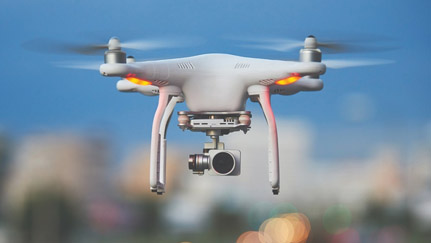
Flying drones can be an enjoyable hobby, but it's important to understand and follow the rules to ensure that you're flying your drones safely and legally. Here’s what you need to know about safe drone operation, flying etiquette and the local laws and ordinances regarding drones.
Safety first
Some people view drones as toys, and in some respects that's accurate. However, even when you're using the drone for recreation, please keep these important safety considerations in mind:
- Obtain FAA clearance before each flight. A drone pilot can easily do this on a smartphone by utilizing the AirMap app, which provides instant clearance or rejection of a flight from the FAA. It’s also important to have a preflight checklist that is always followed prior to operating a drone. The checklist should include the following procedures:
- Verify that flight logs are up to date from the prior inspection.
- Visually inspect the aircraft for damage, which could hinder a safe flight.
- Confirm that the batteries for the aircraft and the controller are charged for the planned flight.
- Check the AirMap app and confirm that the flight area is not restricted. Take screenshots as applicable.
- Verify that the rotors are properly installed.
- Notify bystanders or observers of the planned flight path and request that they maintain an appropriate distance.
- Check that obstacles are not in the way of the drone takeoff or landing paths.
- Always be sure you can see your drone.1 This helps maintain safety and prevents collisions with other objects or buildings. Ask a friend to help you track the drone while you operate it.
- Understand the airspace around you. Generally, you should stick to flying your drone 400 feet or less above ground level.1 This ensures that your drone won't interfere with other aircraft. You’ll also want to check to see whether the area in which you’re flying your drone has its own rules about maximum flight height — it's important to follow these rules.
- Never fly your drone if you're under the influence of a substance. Apply the same logic you do with driving. Alcohol and some prescription medications may interfere with your driving ability, and the same applies to flying drones.2
- Avoid areas with power lines and spaces near government installations. It's smart to avoid heavy-traffic areas in case the drone malfunctions and lands on the highway, which could cause an accident.
- Avoid flying during inclement weather.
- Ensure that the following post-flight responsibilities are completed:
- Wait for the rotors to come to a full stop after landing the drone.
- Turn off the power to the aircraft and controller.
- Check the drone for damage or issues. If drone maintenance or repairs are needed, have them completed prior to the next flight.
- Prepare the drone and rotors for travel and secure them in their case.
- Charge the battery or batteries for the next flight.
- Update the flight logs.
Staying legal
Drones are growing in popularity, and it’s important to familiarize yourself with the requirements for flying them:
- Register your drone with the Federal Aviation Administration (FAA) at faadronezone.faa.gov. Failure to do so could result in hefty fines. You'll receive an ID number that you need to display on all your drones.3
- You can fly almost anytime for fun and recreation. But if you want to fly for business, be sure to secure any necessary permits and clearances. And if you make money from flying drones, you'll need to obtain special licensing from the FAA.4
- Avoid flying over emergency areas and large events at places such as stadiums.1
- Respect the privacy of others. Don't fly and hover over your neighbors or other locations, which can create concerns and uneasiness. If you want to fly over private property, ask the owner. Although laws involving the use of drones in airspace above other people's homes are still somewhat unclear, you're not allowed to substantially interfere with someone's enjoyment of their property.5 Contact a lawyer to learn more about any existing aerial trespass laws in your area.5
Limiting liability
Your drone usage probably isn't covered under your homeowners policy.6 But your policy may cover some of the liabilities associated with flying your drone.7 It's essential to contact your insurance agent to determine what your insurance covers and whether you need to purchase additional coverage. Ask specifically about what happens if you damage your drone and need to cover the costs of repairs or replacement.7
When it comes to liability, insurance becomes a bit murkier. It's essential to find out whether you're covered if your drone damages someone else's property. For example, the drone may lose power and land on someone's car, cracking the windshield. Or it may land on a person who then requires medical treatment. Liability coverage can protect you if your drone is found to cause an accident involving another person or their property.7
Next steps
Find out whether your insurance can cover liability and whether there are exclusions, or things that specifically aren't covered in your policy. It's also worth checking to see whether you can add a rider or endorsement to your policy to gain coverage for your drone.
Even with the most careful use and training, drone accidents happen. Being prepared is the best defense and can give you more peace of mind while you're enjoying this fun hobby.
[2] https://www.pcmag.com/article/337889/drone-regulations-what-you-need-to-know
[3] https://uavcoach.com/drone-laws-in-united-states-of-america
[4] http://knowbeforeyoufly.org/learn-the-drone-laws
[5] https://www.bfvlaw.com/bothered-by-a-drone-in-your-backyard-heres-what-you-need-to-know
[6] https://uavcoach.com/drone-insurance-guide
[7] https://www.thebalance.com/what-you-need-to-know-about-drones-and-your-insurance-3961255
This information is designed for informational purposes only and was obtained from sources believed to be reliable. It is not legal advice, nor is it a substitute for such advice. Nationwide Mutual Insurance Company, its affiliates and their employees make no warranties about the information nor guarantee of results, and they assume no liability in connection with the information provided. Nationwide, the Nationwide N and Eagle, Nationwide is on your side and Nationwide Private Client are service marks of Nationwide Mutual Insurance Company.